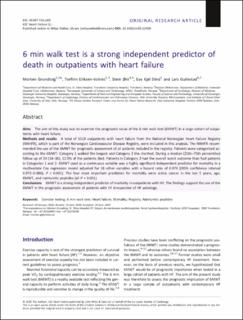6 min walk test is a strong independent predictor of death in outpatients with heart failure
Peer reviewed, Journal article
Published version

Åpne
Permanent lenke
https://hdl.handle.net/11250/2673379Utgivelsesdato
2020Metadata
Vis full innførselSamlinger
Sammendrag
The aim of this study was to examine the prognostic value of the 6 min walk test (6MWT) in a large cohort of outpatients with heart failure.
Methods and results A total of 5519 outpatients with heart failure from the National Norwegian Heart Failure Registry
(NNHFR), which is part of the Norwegian Cardiovascular Disease Registry, were included in this analysis. The NNHFR recommended the use of the 6MWT for prognostic assessment of all patients included in the registry. Patients were categorized according to the 6MWT: Category 1 walked the longest and Category 3 the shortest. During a median (25th–75th percentiles)
follow-up of 24 (14–36), 12.9% of the patients died. Patients in Category 3 had the overall worst outcome than had patients
in Categories 1 and 2. 6MWT used as a continuous variable was a highly significant independent predictor for mortality in a
multivariate Cox regression model adjusted for 16 other variables with a hazard ratio of 0.979 [(95% confidence interval
0.972–0.986), P < 0.001]. The four most important predictors for mortality were active cancer in the last 5 years, age,
6MWT, and natriuretic peptides (all P < 0.001).
Conclusions 6MWT is a strong independent predictor of mortality in outpatients with HF. The findings support the use of the
6MWT in the prognostic assessment of patients with HF irrespective of HF aetiology.
